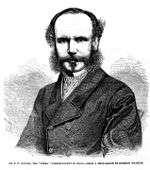Thomas William Bowlby
| Thomas William Bowlby | |
|---|---|
 | |
| Born |
7 January 1818 Gibraltar |
| Died |
22 September 1860 (aged 42) Tongzhou District, Beijing, China |
| Resting place | Andingmen, Beijing, China |
| Occupation | Journalist |
Thomas William Bowlby (7 January 1818 – 22 September 1860) was a British correspondent for The Times in Germany and China in the 19th century.
Early life
Born in Gibraltar, he was the son of Thomas Bowlby, a Captain in the Royal Artillery, and Williamina Martha Arnold Balfour, daughter of Major-General William Balfour, a former Lieutenant-Governor of New Brunswick. Bowlby's parents moved while he was young to Sunderland, where his father became a timber merchant. Bowlby was educated by Dr Cowan, a Scottish school teacher living in Sunderland.
After finishing his schooling he trained as a solicitor under his cousin Russell Bowlby of Sunderland and on completion of his training he moved to London where spent some years as a salaried clerk to a law firm in The Temple. In 1846 he became junior partner to the firm of Lawrence, Crowdy and Bowlby. However, Bowlby found the law uncongenial and felt drawn to a career in writing.
Career
Although he remained as a member of the firm of Lawrence, Crowdy and Bowlby until 1854, Bowlby went to Berlin as a special correspondent for The Times in 1848 to report on the revolutions occurring in Europe at the time.
In 1860, Bowlby was engaged to travel to China as the special correspondent of The Times to cover the Second Opium War, which was fought by the Chinese Qing Empire against the British and French. Lord Elgin and Baron Gros were his fellow passengers on the steamship SS Malabar, which sank in Galle harbour on 22 May 1860 after being beached in a severe storm. Bowlby's report of the shipwreck was considered one of his best pieces of work.
Bowlby's reports from China were informative and popular with readers of The Times. After the capture of Tientsin (Tianjin) on 23 August 1860, Bowlby accompanied the British envoys Henry Loch and Harry Smith Parkes and their escorts to Tungchow (present-day Tongzhou District, Beijing) to arrange a peace treaty with the Qing Empire. However, when the negotiations broke down, the Qing general Sengge Rinchen arrested Bowlby and the delegation. Bowlby and the other captives were held at Tungchow and tortured to death over several days. Constricting ligatures were applied to their bodies; as they dried, they tightened. Those who cried out for water had dirt poured into their mouths. Bowlby died on 22 September.[1] In retaliation, the British and French burnt down the Qing Empire's Old Summer Palace (Yuanmingyuan) in Beijing.
Bowlby's mangled body was retrieved later and buried in the Russian cemetery outside the Anding Gate of Beijing on 17 October 1860. He was survived by his widow and five young children, among whom included the surgeon Sir Anthony Alfred Bowlby.
See also
Notes
Citations
- ↑ "The palace of shame that makes China angry". BBC NEWS. 2 February 2015.
References
- Bowlby, Ronald (2004-06-18). "A Times man in war-torn China". The Times. Retrieved 2008-01-03.
- "Benjamin Bowlby and others". Retrieved 2007-08-08.
- "Thomas William Bowlby". Retrieved 2007-08-08.
- Bowlby, Thomas William; C.C. Bowlby (1906). An Account of the Last Mission and Death of Thomas William Bowlby. Privately printed by C.C. Bowlby.